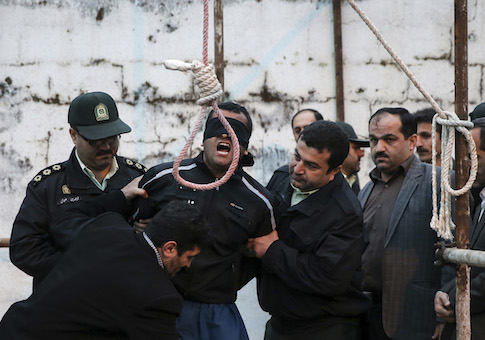The U.S. Treasury Department on Friday issued new sanctions on an Iranian government official who it says has been instrumental in the censorship and repression of Iranian citizens.
The new sanctions were leveled against Iranian official Morteza Tamaddon, head of the Tehran Provincial Public Security Council.
Tamaddon has been "personally responsible" for harassing Iranian political opponents, censoring free speech, and threatening political opponents of the ruling regime, according to the Treasury Department.
It is unclear how the new sanctions could impact nuclear discussion between the United States and Iran, which has declared in the past that it would walk away from nuclear negotiations if any new sanctions were issued.
Undersecretary for Terrorism and Financial Intelligence David S. Cohen said the new sanctions are part of an effort to hold Iran accountable for its numerous and growing human rights abuses, which include the harassment, imprisonment, and execution of hundreds of Iranians each year.
"The United States is keenly focused on promoting opportunities for the Iranian people to fully exercise their universal rights," Cohen said in a statement. "We will continue building on the U.S. government’s longstanding efforts to contest the Iranian government censorship of the Iranian people."
Tamaddon, whose assets and property have now been blocked and who has been barred from foreign financial transactions, is said to be key to the Iranian government’s bid to repress political opponents and reformers.
"As former governor-general of Tehran Province, he used his authority to penalize the exercise of and limit Iranians’ freedom of expression and assembly following the disputed 2009 elections in Iran," according to the Treasury Department.
"Tamaddon has been personally responsible for the harassment of Iranian political opposition leaders Mehdi Karroubi and Mir-Hossein Mousavi," the Treasury Department explained in the sanctions notice. "In addition, he used his position to cut off mobile phone communications during political demonstrations and to silence and intimidate Iranian citizens in 2012 by publicly threatening political protesters."
Due to his actions Tamaddon now finds himself on the Office of Foreign Assets Control’s List of Specially Designated Nationals and Blocked Persons.
Any property or interest he has accrued in the United States has been blocked, and no U.S. entity can engage in financial transactions with him. Additionally, foreign financial institutions would face penalties for engaging in transactions that would benefit Tamaddon.
The Iranian regime’s repression of its citizens goes well-beyond censorship and harassment.
The Obama administration has remained virtually silent as scores of Iranians are executed for petty crimes and dubious charges.
Iran was scheduled to hang two religious minority activists yesterday after being tortured and facing what human rights observers described as unfair trials.
Another prisoner was hanged on Thursday, and last week a woman was hanged in front of her two daughters.
Nine people were simultaneously hanged earlier this month in Southwestern Iran.
The U.S. pastor being held prisoner in Iran also faced a new round of beatings and torture after Iranian prison guards dragged him from his hospital bed, according to reports.
Regional experts said that the Obama administration is not doing nearly enough to address these vast human rights issues.
"This just goes to show you how unserious the Obama team is on Iran," said Michael Rubin, a former Pentagon adviser on Iran and Iraq. "They are sanctioning someone for censorship? Does Obama believe that a single individual is responsible for censorship in Iran?"
"This is the equivalent of sanctioning a single person in the Soviet Union for communism," Rubin said. "The problem is the system and the ideology, and if they’re serious about their objections, then it’s time to sanction each and every individual in the Ministry of Islamic Guidance and Culture, the Islamic Propagation Office, the Intelligence Ministry, the paramilitary Basij, and the Supreme Leader’s Office, all of whom are engaged daily in censorship and repression."
Rubin suspects that the sanctions were a way for the Obama administration to "appease" critics of the interim nuclear accord, which significantly rolled back sanctions on Iran and opened up its economy to foreign investors.
"To suggest that sanctioning Mr. Tamaddon addresses the problem is akin to promising a Stage IV cancer patient that we won’t treat your tumor but no worries—we’ll take care of that ingrown toenail," Rubin said.
However, the sanctions could anger officials in Tehran, who have been adamant that no new sanctions be issued during the nuclear talks.
